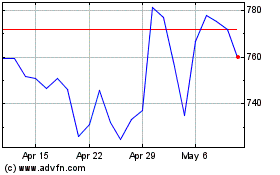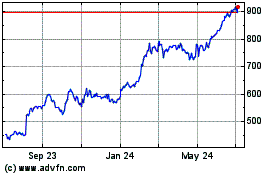Eli Lilly Asks FDA to Authorize Covid-19 Antibody Drug--2nd Update
October 07 2020 - 4:48PM
Dow Jones News
By Peter Loftus
Eli Lilly & Co. said it has requested U.S. authorization for
the emergency use of an experimental antibody-based treatment for
people with recently diagnosed, mild-to-moderate Covid-19, a step
that could open the door to a new class of coronavirus treatments
capable of helping early cases and perhaps even preventing
them.
Lilly said it is manufacturing doses of the drug, which was
derived from a blood sample of one of the earliest U.S. survivors
of Covid-19, and could have 100,000 doses this month and as many as
one million by the end of the year.
If cleared for use, the drug could be the first to treat less
severe cases of Covid-19. The few other therapies authorized for
Covid-19 treatment, including remdesivir from Gilead Sciences Inc.
and convalescent plasma, target hospitalized patients with more
serious cases.
Lilly said it would seek authorization for use in higher-risk
patients to prevent their recently diagnosed mild- to moderate
disease from worsening to a severe state. Executives of the
Indianapolis-based company said higher-risk groups may include
people 65 years of age and older or obese patients.
"Anything that helps with preventing hospitalization and
preventing progression is going to be a big advance," Rajesh Tim
Gandhi, an infectious-disease physician at Massachusetts General
Hospital and Harvard Medical School, said in an interview.
Lilly's antibody drug could also be the first in a new class of
Covid-19 agents that could not only provide treatment but also
potentially give temporary protection against the virus to people
at risk of infection. That would fill a gap until vaccines are
authorized, though people may need to take the antibody drugs more
than once to sustain the protection.
"When we started this project we always believed that vaccines
would be a long-term solution but that antibodies could come to
patients faster," Lilly research head Daniel Skovronsky said in an
interview. "We can make them faster, test them faster."
The leading experimental antibody drugs have shown enough
promise in testing so far that President Trump was given one
developed by Regeneron Pharmaceuticals Inc.
Regeneron said it is in talks with the Food and Drug
Administration about a potential emergency-use authorization based
on data it released last week showing its drug improved patients'
symptoms and lowered virus levels as measured in lab tests.
Lilly said last month its drug reduced the rate of
hospitalization compared with a placebo in a study. About 1.6% were
hospitalized or visited the emergency room for Covid-19 after being
injected with the drug, compared with 5.8% of people who didn't get
the drug in the study
Antibody treatments are meant to mimic the human immune system's
own agents that can neutralize the new coronavirus.
The Lilly antibody, LY-CoV555, came from a collaboration between
Lilly and AbCellera Biologics Inc., of Vancouver, Canada. AbCellera
isolated antibodies from a blood sample taken from one of the first
people in the U.S. to recover from Covid-19. The antibody therapy
is essentially a clone of one of those antibodies.
In August, Lilly started a study in nursing homes, testing
whether LY-CoV555 could reduce the rate of infection and disease
among vulnerable residents and staff after a case had been
diagnosed at the facility.
The National Institutes of Health also has launched studies of
Lilly's antibody in hospitalized and non-hospitalized Covid-19
patients.
Lilly said a new study showed that combining LY-CoV555 with
another antibody reduced viral load, symptoms and hospitalizations
in Covid-19 patients, compared with a placebo. The rate of
Covid-19-related hospitalization and emergency-room visits was 0.9%
among those who received the combination therapy, compared with
5.8% in the placebo group.
The company expects to seek emergency-use authorization for the
combination in November.
The FDA said it doesn't comment on current or pending regulatory
submissions.
The second antibody in the combination therapy, LY-CoV016, came
from a partnership with Junshi Biosciences, of China. Each antibody
targets a different region of the spike protein that is found on
the surface of the new coronavirus.
The company also is in discussions with regulators outside the
U.S. to potentially approve the use of its single and combination
antibody therapies.
Lilly said it expects to make 50,000 doses of the combination
therapy this year, and that supply would increase substantially
early next year. Lilly recently formed a collaboration with Amgen
Inc. to help manufacture antibodies, and Lilly said Wednesday it
would pursue additional partnerships to provide the treatments to
resource-limited countries.
--Joseph Walker contributed to this article.
Write to Peter Loftus at peter.loftus@wsj.com
(END) Dow Jones Newswires
October 07, 2020 16:33 ET (20:33 GMT)
Copyright (c) 2020 Dow Jones & Company, Inc.
Eli Lilly (NYSE:LLY)
Historical Stock Chart
From Mar 2024 to Apr 2024

Eli Lilly (NYSE:LLY)
Historical Stock Chart
From Apr 2023 to Apr 2024
